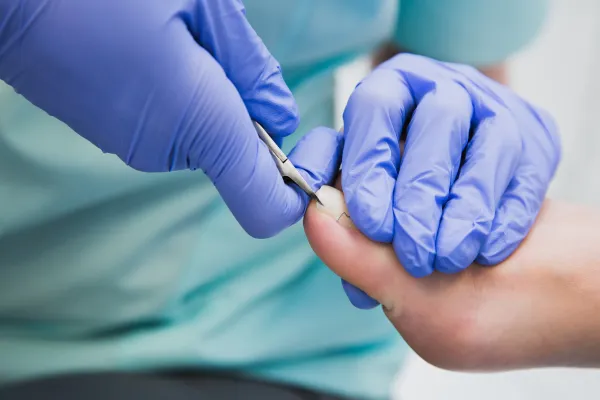Tips & Advice From West Haven Foot and Ankle Center

Ingrown Toenail Complications: What Can Go Wrong?
Ingrown toenails might seem like a minor inconvenience, but without proper treatment, they can lead to serious complications. At West Haven Foot and Ankle Centre, we stress the importance of addressing ingrown toenails promptly to prevent further issues. This blog post explores what can go wrong if an ingrown toenail is left untreated.
Complications of Untreated Ingrown Toenails
Infection: The most common complication of an untreated ingrown toenail is an infection in the toe. If the nail breaks the skin, bacteria can enter, leading to redness, increased pain, swelling, and pus. This condition requires medical treatment to prevent the infection from spreading.
Abscess Formation: In more severe cases, an untreated ingrown toenail can lead to the formation of an abscess. This painful collection of pus needs to be drained by a healthcare professional and treated with antibiotics.
Foot Cellulitis: If the infection from an ingrown toenail spreads, it can lead to cellulitis, a serious bacterial skin infection that quickly becomes severe, causing a deep red coloration, swelling, and a hot, tender feeling. Cellulitis can spread rapidly, affecting deeper tissues and even entering the bloodstream.
Osteomyelitis: In extreme cases, the infection can reach the bones in the toe, leading to osteomyelitis, a bone infection that can cause severe health problems and may require surgery to remove infected bone tissue.
Impaired Mobility: Chronic pain from repeated or severe ingrown toenails can limit mobility. This is particularly problematic for older adults or those with preexisting conditions like diabetes, where mobility is crucial for overall health.
Nail Deformity: Over time, recurrent ingrown toenails can cause permanent changes in the shape and growth pattern of the toenail, potentially leading to chronic problems and a need for more invasive treatments or surgery.
Prevention and Early Treatment
Preventing ingrown toenails and addressing them when they first appear can help avoid these complications. Here are a few tips:
Proper Nail Trimming: Cut toenails straight across and not too short. Rounded corners can encourage nails to grow into the skin.
Appropriate Footwear: Wear shoes with enough room for your toes. Tight shoes can compress the toes and exacerbate the risk of ingrown toenails.
Foot Hygiene: Keep your feet clean and dry to prevent bacterial growth around vulnerable areas.
Regular Checks: Inspect your feet regularly for signs of nail issues, especially if you have diabetes or another condition that affects foot health.
Conclusion
If you suspect you have an ingrown toenail, especially if you notice signs of infection, it’s important to seek professional care. Early intervention by a podiatrist can prevent complications and help maintain your foot health. Visit us at West Haven Foot and Ankle Centre for expert care and treatment options tailored to your needs. Don’t wait until minor discomfort becomes a major health issue.
Ask West Haven Foot and Ankle Center And Their Team
Fill in the form to request a call from our team. One of our team members will call you for FREE and answer any questions or concerns you may have about your condition
Where To Find West Haven Foot and Ankle Center

If you have any questions before scheduling an appointment or for general inquiries, please use the contact us button below. Our team will promptly reach out to assist you.
Opening Hours
Monday: 8am - 5pm
Tuesday: 8am - 5pm
Wednesday: Closed
Thursday: 8am - 5pm
Friday: 8am - 5pm
Saturday: Closed
Sunday: Closed

